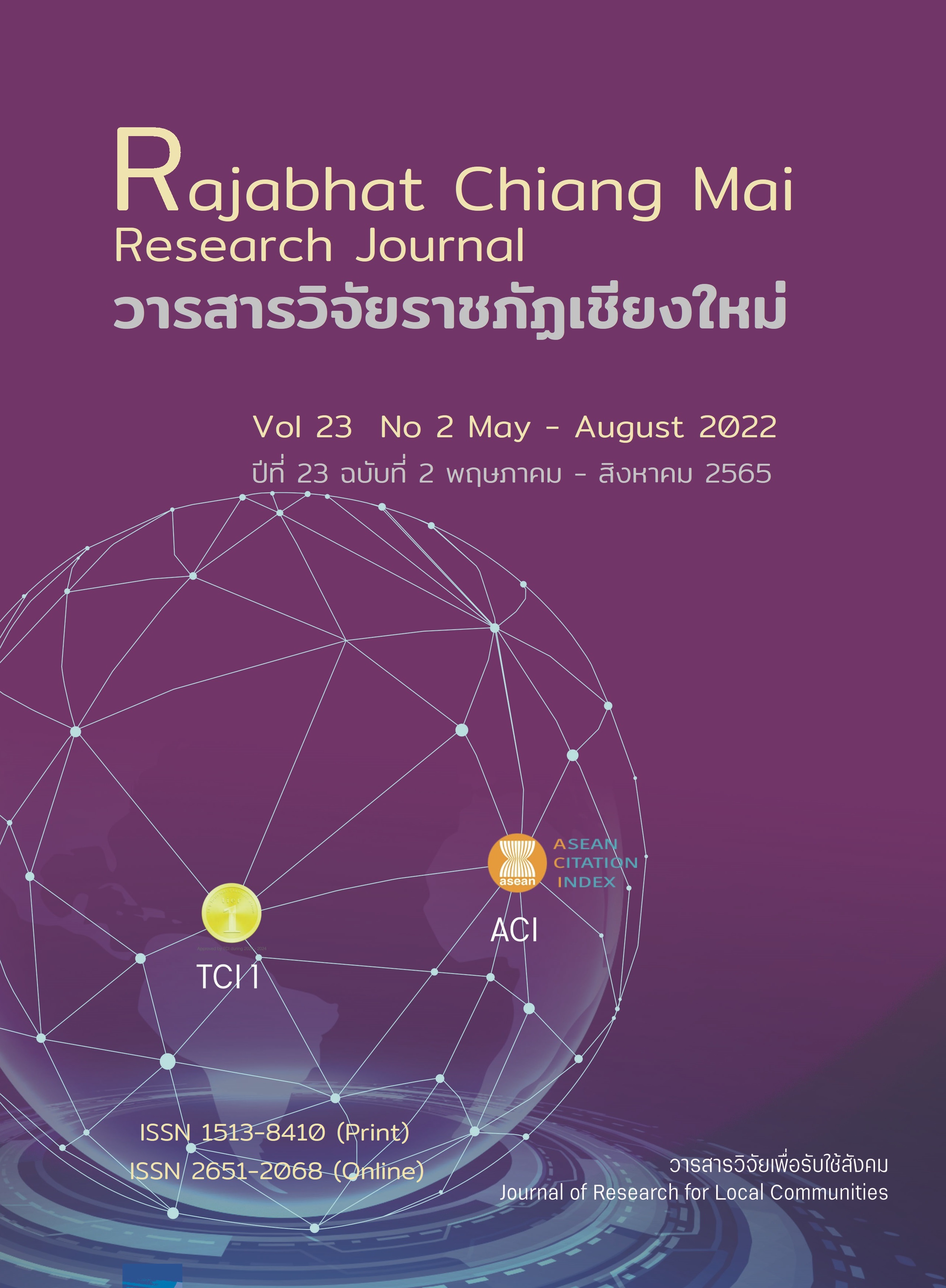แนวทางการประยุกต์ใช้ศาสตร์พระราชาในการบริหารสถานศึกษา
DOI:
https://doi.org/10.14456/rcmrj.2022.254163คำสำคัญ:
แนวทาง, ศาสตร์พระราชา , การบริหารสถานศึกษาบทคัดย่อ
วัตถุประสงค์ของการวิจัยเรื่องนี้ คือ 1) เพื่อวิเคราะห์สภาพปัจจุบัน ปัญหา และปัจจัยเอื้อต่อการประยุกต์ใช้ศาสตร์พระราชาในการบริหารการศึกษา และ 2) เพื่อสังเคราะห์แนวทางการประยุกต์ใช้ศาสตร์พระราชาในการบริหารสถานศึกษา การวิจัยครั้งนี้ เป็นการวิจัยเชิงคุณภาพ โดยมีผู้ให้ข้อมูลหลัก เลือกแบบเจาะจง ได้แก่ ผู้บริหาร ครู และคณะกรรมการสถานศึกษาของโรงเรียนแม่แตง ซึ่งเป็นโรงเรียนต้นแบบสถานศึกษาพอเพียง สังกัดสำนักงานเขตพื้นที่การศึกษามัธยมศึกษาเขต 34 โดยมีการดำเนินการวิจัยออกเป็น 3 ขั้นตอน ดังนี้ 1) การศึกษาจากข้อมูลเอกสาร 2) วิเคราะห์สภาพปัจจุบัน การศึกษาปัญหาและปัจจัยเอื้อ ต่อการประยุกต์ใช้ศาสตร์พระราชาในการบริหารสถานศึกษาโดยใช้วิธีการสัมภาษณ์แบบเจาะลึก 3) การสังเคราะห์แนวทางการประยุกต์ใช้ศาสตร์พระราชาในการบริหารสถานศึกษาโดยการจัดอภิปรายระดมสมองนักศึกษาครุศาสตร์ดุษฎีบัณฑิต จำนวน 9 คน ที่ลงเรียนวิชาการบริหารการศึกษาตามศาสตร์พระราชา (EDA 7203) ผลการศึกษาวิจัย พบว่า สภาพปัจจุบัน ปัญหา และปัจจัยเอื้อต่อการประยุกต์ใช้ศาสตร์พระราชาในการบริหารสถานศึกษาในการดำเนินงานโรงเรียนต้นแบบสถานศึกษาพอเพียง 4 ด้าน ได้แก่ 1) ด้านการบริหารวิชาการ 2) ด้านการมีส่วนร่วม 3) ด้านการบริหารงานบุคคล และ 4) ด้านความยั่งยืน แนวทางการประยุกต์ใช้ศาสตร์พระราชาในการบริหารสถานศึกษา ประกอบด้วย 1) โรงเรียนควรมีกลยุทธ์ในการประยุกต์ใช้ศาสตร์พระราชาในจัดการเรียนการสอนเพื่อยกระดับคุณภาพการศึกษา 2) โรงเรียนควรมีแนวปฏิบัติด้านกระบวนการประยุกต์ใช้ศาสตร์พระราชาในจัดการเรียนการสอน 3) โรงเรียนควรมีแนวปฏิบัติด้านการติดตามประเมินผล และ 4) ผู้บริหารสถานศึกษาควรมีบทบาทในการน้อมนำศาสตร์พระราชาไปปฏิบัติ
Downloads
เอกสารอ้างอิง
Arbuckle, J. L. (2016). AMOS 20.0 users guide. Crawfordville, FL: Amos Development Corporation.
Bank of Thailand. (2019). Thai Economy Report 2019. Retrieved from https://www.bot.or.th/Thai/MonetaryPolicy/EconomicConditions/Annual Report/Annual Report/AanualReport2563.pdf. (In Thai)
Brenes, E. R., Montoya, D., & Ciravegna, L. (2014). Differentiation Strategies in Emerging markets: The Case of Latin American Agribusinesses. Journal of Business Research, 67(5), 847-855. DOI:10.1016/j.jbusres.2013.07.003
Comrey, A. L., & Lee, H. B. (2016). A First Course in Factor Analysis. (2nd ed.). New York: Psychology Press.
Electronic Transactions Development Agency. (2019). Value of e-Commerce Survey in Thailand 2019. Bangkok: Ministry of Digital Economy and Society. (In Thai)
Future, B. (2009). Country Brand Index 2008 Insights, Finding and Country Ranking: 2008 Country Brand Index Rankings Highlights. Retrieved from http://www.countrybrandindex.com/country-brand-rankings/.
Hair, J. F., Black, W. C., Babin, B. J., & Anderson, R. E. (2010). Multivariate Data Analysis. (7th ed.). Upper saddle River, NJ: Pearson Education International.
Hritzuk, N., & Jones, K. (2014). Multiscreen Marketing: The Seven Things You Need to Know to Reach Your Customers Across TVs, Computers, Tablets, and Mobile Phones. (1st ed.). Wiley.
Kaur, G. (2017). The Importance of Digital Marketing in Tourism Industry. International Journal of Research – Granthaalayah, 5(6), 72-77.
Ian, W., et. al. (2009). The Development of Competent Marketing Professionals. Journal of Marketing Education, 31(3), 15-16. DOI:10.29121/granthaalayah.v5.i6.2017.1998
Phumsiri, N., Bua-In, N., & Silpcharu, T. (2020). Guidelines on Effective Online Advertising in Industrial Business Sector. International Journal of Entrepreneurship, 24(3), 1-12.
Raksawong, N. (2015). The Study of Human Resource Development of Southeast Asia University to Improve Working Performance. (MBA, Siam University). (In Thai).
Román, S., & Ruiz, S. (2005). Relationship outcomes of perceived ethical sales behavior: the customer’ s perspective. Journal of Business Research, 58(4), 439-445.
Saion, W. (2016). Academic Forums Thailand 4.0. Bangkok. Academic bureau Secretariat of the House of Representatives. (In Thai)
Schultz, D.E. & Block, M.P. (2009). Media Generations: Media Allocation in a Consumer- Controlled Marketplace. Ohio: Prosper.
Silpcharu, T. (2017). Statistical research and analysis with SPSS and AMOS. (15th ed.). Bangkok: Business R&D. (In Thai).
Silpcharu, T. & Wantanakomol, S. (2017). A Structure Equation Modeling of Guidelines for Sustainable OTOP Production Management, Using Sufficiency Economy Theory. International Journal of Applied Business and Economic Research, 15(22), 863-872.
Sujova, A., & Rajnoha, R. (2012). The Management Model of Strategic Change Based on Process Principles. Procedia - Social and Behavioral Sciences, 62(2012),1286-1291. DOI:10.1016/j.sbspro.2012.09.220
Tabachnick, B. G., & Fidell, L. S. (2007). Using Multivariate Statistics. Boston MA: Pearson Education.
Till, B. D., & Baack, D. W. (2005). Recall and persuasion: Does creative advertising matter?. Journal of advertising, 34(3), 47-57. DOI:10.1080/00913367.2005.10639201
ดาวน์โหลด
เผยแพร่แล้ว
รูปแบบการอ้างอิง
ฉบับ
ประเภทบทความ
สัญญาอนุญาต
ลิขสิทธิ์ (c) 2022 วารสารวิจัยราชภัฏเชียงใหม่

อนุญาตภายใต้เงื่อนไข Creative Commons Attribution-NonCommercial-NoDerivatives 4.0 International License.
1. บทความ ข้อมูล เนื้อหา รูปภาพ ฯลฯ ที่ได้รับการตีพิมพ์ใน “Community and Social Development Journal” ถือเป็นลิขสิทธิ์ของ Community and Social Development Journal มหาวิทยาลัยราชภัฏเชียงใหม่ และเพื่อให้เผยแพร่บทความได้อย่างเหมาะสมผ่านสื่อสิ่งพิมพ์และอิเล็กทรอนิกส์ ผู้เขียนยังคงถือครองลิขสิทธิ์บทความที่ตีพิมพ์ภายใต้ใบอนุญาต Creative Commons Attribution (CC BY) ซึ่งอนุญาตให้เผยแพร่บทความซ้ำในแหล่งอื่นได้ โดยอ้างอิงต้องอ้งอิงบทความในวารสาร ผู้เขียนต้องรับผิดชอบในการขออนุญาตผลิตซ้ำเนื้อหาที่มีลิขสิทธิ์จากแหล่งอื่น
2. เนื้อหาบทความที่ปรากฏในวารสารเป็นความรับผิดชอบของผู้เขียนบทความโดยตรง ซึ่งกองบรรณาธิการวารสารไม่จำเป็นต้องเห็นด้วยหรือร่วมรับผิดชอบใดๆ














